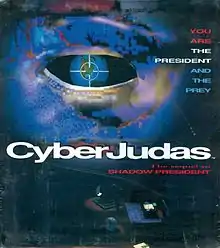| CyberJudas | |
|---|---|
 | |
| Developer(s) | D.C. True, Ltd.[1] |
| Publisher(s) | Merit Studios[1] |
| Designer(s) | Robin Antonik Charlie Athanas Brad Stock Glenn Doren |
| Series | Shadow President |
| Platform(s) | MS-DOS |
| Release | |
| Genre(s) | Presidential simulation game |
| Mode(s) | Single-player |
CyberJudas is a presidential simulation video game for MS-DOS-compatible computers, and is the sequel to Shadow President. CyberJudas contains many of the same cyberpunk/dark science fiction elements of the original game, but adds themes of espionage and treason.
Gameplay
The player takes the role of the President of the United States of America, and must handle an ongoing timeline of world events by making political decisions and engaging in diplomatic, economic and military interactions with other computer-controlled states. The player is attended by a cabinet of computer-controlled advisors, each with their own area of responsibility, who will offer advice on actions to be taken.
The game features three modes of play. In the Presidential Simulator, the only goal is to remain in power by maintaining sufficient popularity to avoid electoral defeat, impeachment or assassination. If popularity is maintained, the player's term as president can continue beyond the US' real-life limit of two terms, however terms must be consecutive: being voted out ends the game. In the Presidential Simulator, the player's cabinet work in the player's interest and deliver relatively unbiased advice.
The second mode is Cabinet Wars, in which each member of the player's cabinet has their own political perspective and agenda, and will attempt to manipulate the player's decisions for their own ends.
The final mode, and the source of the game's title, is the CyberJudas Gambit. In this mode, one member of the cabinet is an outright traitor, working directly against the player and the US. In this mode, the 'CyberJudas' will attempt to create catastrophic situations for which the player will be blamed. As well as successfully managing the day-to-day concerns of the US, the player in this mode must also identify and defeat the CyberJudas.
Reception
| Publication | Score |
|---|---|
| Computer Game Review | 70/100[2] |
Tasos Kaiafas of Computer Game Review opined, "CyberJudas does show its age, which may have a dual effect." He found it technically dated, but argued that its gameplay attains "a level that transcends today's viscerally oriented 3-D worlds."[2]
References
- 1 2 3 "Release information". GameFAQs. Retrieved 2009-03-20.
- 1 2 Kaiafas, Tasos (July 1996). "CyberJudas is old-school but cool". Computer Game Review. Archived from the original on December 21, 1996.
External links
- CyberJudas at Home of the Underdogs
- CyberJudas can be played for free in the browser at the Internet Archive